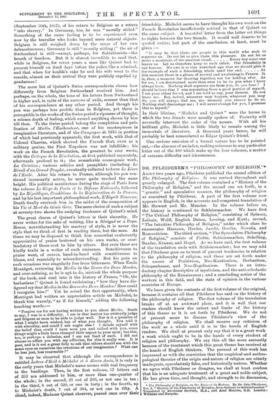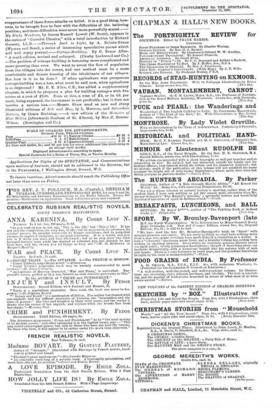DR. PFLEIDERER'S "PHILOSOPHY OF RELIGION."* ABOUT two years ago, Pfleiderer
published the second edition of The Philosophy of Religion. It. was revised throughout and greatly enlarged. The first volume contained a "History of the Philosophy of Religion," and the second one set forth, in a " genetic " and speculative manner, the philosophy of religion as conceived by Pfleiderer. A part of the first volume now appears in English, in the accurate and competent translation of Mr. Stewart and Mr. Menzies. In the volume before us, the history is continued to Schleiermacher. We have first "The Critical Philosophy of Religion," consisting of Spinoza, Leibniz, Wolff, English Deism, Leasing, and Kant; second, "The Intuitive Philosophy of Religion," under which class he enumerates Hamann, Herder, Jacobi, Goethe, Novalis, and Romanticism. The third section, "The Speculative Philosophy of Religion," consists of Fichte, Schleiermacher, Schelling, Baader, Krause, and Hegel. As we have said, the first volume of the translation ends with Schleiermacher ; but we may add that Pfleiderer goes on to treat of present tendencies in relation to the philosophy of religion, and these are set forth under the names of Positivism, Neo-Kantianism, Herbartism, Schopenhauer, and Neo-Hegelianism. There is an intro- ductory chapter descriptive of mysticism, and the anti-scholastic philosophy of the Renaissance ; and a concluding notice of the workers in this field, and the state of opinion in the various countries of Europe.
We have given the contents of the first volume of the original, because it contains all that Pfleiderer has said on the history of the philosophy of religion. The first volume of the translation breaks off at an awkward place, and it is well that our readers should know the extent and limits of the history of this theme as it is set forth by Pfleiderer. We do not at present mean to discuss Pfleiderer's view of the philosophy of religion. We shall reserve any criticism of the work as a whole until it is in the hands of English readers. We shall at present only say that it is a great work a work which ought to be in the hands of every student of religion and philosophy. We say this all the more earnestly
because of the treatment which this great theme has received at the hands of English thinkers. The perusal of this work has
impressed us with the conviction that the empirical and anthro- pological theories of the origin and nature of religion are utterly inadequate, speculatively false, and historically untrue. Whether we agree with Pfleiderer or disagree, we shall at least confess that his is an adequate treatment of a great and noble subject. He has given time, and thought, and strength to its discussion, • The Philosophy of Religion, on the Basis of its History. By Dr. Otto Pfleiderer. Vol. I. "History of the Philosophy of Religion, from Spinoza to Schleiermacher." Translated by Alexander Stewart, ILA., and Alan Menzies, S.D. London Williams and Iforgate. reappearance of these fierce attacks on belief. It is a good thing, how- ever, to be brought face to face with the difficulties of the believing position; and these difficulties were never more powerfully stated.— My Study Windows, by Tames Russell Lowell (W. Scott), appears in the series of "Camelot Classics," with a brief introduction by Richard Garnett, LL.D.---Through Dark to Light, by A. Enbule-Evans (Wyman and Sons), a series of interesting speculative poems which will well repay perusal.—Cottage-Building. By C. Bruce Allen. " A tenth edition, revised and enlarged. (Crosby Lockwood and Co.) —The problem of cottage-building is becoming more complicated and more pressing than ever. We want to arrest the flow of population from the villages into the towns, and one method must be a more comfortable and decent housing of the inhabitants of our villages. But how is it to be done ? If when agriculture was prosperous cottage-building was a loss, what must be said now, when agriculture is so depressed ? Mr. E. E. Allen, C.E., has added a supplementary chapter, in which he proposes a plan for building cottages with five rooms at a cost of 2100. Even at this, a rent of 24, or Is. 6d. per week-, being supposed, the investment is not profitable; but it does not involve a serious loss.—Messrs. Shaw send us new and cheap illustrated editions of Rob and May, by L. Marston, and Silverdale Rectory, by Grace Stebbing.—A new edition of the Memoirs of Miss Mellon (afterwards Duchess of St. Albans), by Mrs. C. Barron- Wilson. (Remington and Co.)

















































 Previous page
Previous page